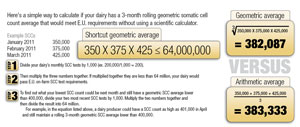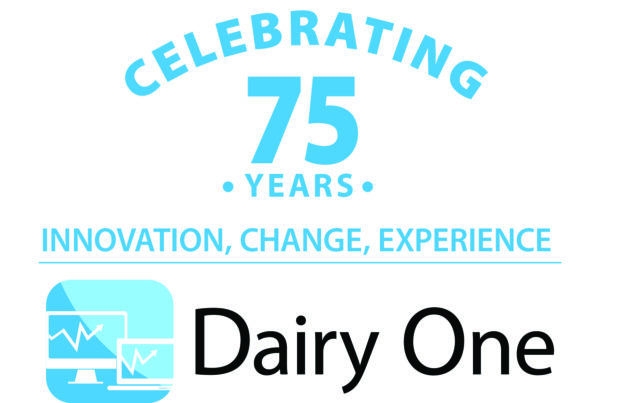Dairymen can still legally sell Grade A milk in the U.S. if their herd’s average somatic cell count (SCC) is greater than 400,000 after August 1, but their options may be more limited without some effort. In November, the USDA announced it had agreed with the E.U. to begin certifying U.S. dairy farms that produce milk used for products or ingredients exported to the E.U. that have an on-farm average SCC of 400,000 or less. Many co-ops say they will ask their farms to comply with the agreement’s lower SCC standards, rather than segregate milk supplies. Most will start communicating this month the changes their members will see in order to be in compliance.
 “We’ve been doing it wrong since day 1, really,” says Ken Vorgert, chief of the dairy grading branch at the USDA’s Agricultural Marketing Service.
“We’ve been doing it wrong since day 1, really,” says Ken Vorgert, chief of the dairy grading branch at the USDA’s Agricultural Marketing Service.
Click here or on the image at the right to view it at full size in a new window.
The requirement that SCCs on farm be lower than 400,000 is rooted in a 1998 trade agreement between the U.S. and the E.U.
In that document, the two trading partners agreed to have mutually consistent milk quality standards for SCCs and standard plate counts (SPCs). Vorgert says that shortly after the agreement was made, the E.U. amended its member nations’ SCC requirements to 400,000 as determined by on-farm tests, not commingled milk at a plant, as previously agreed upon.
So while the 1998 agreement indicated both countries had agreed to be consistent, the U.S. was actually not in compliance. The E.U. brought up the issue during a compliance audit in June 2010.
“We thought we were in compliance; we were not,” Vorgert says. “The E.U. brought it to our attention and said, ‘You need to fix this.’ Once they pointed it out, we said, ‘Oh, yeah, I guess you’re right.’”
U.S. officials from the FDA, APHIS, the USDA, Foreign Ag Service and other industry trade representatives studied the E.U.’s regulations before releasing in November new U.S. protocols for certifying on-farm milk quality is in compliance with E.U. standards.
“Based on what we were able to learn, the member countries in the E.U. do abide by the somatic cell count limit of 400,000,” says Beth Briczinski, director of dairy foods and nutrition with National Milk Producers Federation.
“As we looked into this issue more deeply, we realized that while the E.U. adheres to the 400,000 somatic cell count limit, each of the member countries implements it differently. There is a lot of flexibility afforded to the member countries in how they address the 400,000 SCC limit.
Because of this, the program USDA proposed also has similar flexibility – like the various derogations – for the U.S. industry.”
The USDA has announced two types of derogations, or exceptions to the rule, will be granted if a farm’s three-month rolling SCC is above 400,000. The first derogation will permit farms only non-compliant during certain times of the year due to environment or weather a seasonal derogation.
These will be valid for three years. The other derogation will permit a farm not in compliance to continue to ship certified milk for use in the E.U. for one year. Both derogations, Vorgert says, should be renewable.
“Derogations will generally be granted,” Vorgert says.
So, for example, a co-op or handler of milk for a dairy with an arithmetically or geometrically calculated mean higher than 400,000 by April of this year will be required to report to the USDA that the dairy is out of compliance.
If that dairy remains unable to lower its three-month SCC mean below 400,000 for three consecutive months, the dairy would need to apply for a derogation. That would mean by August of this year dairies currently out of compliance that do not improve their milk quality to the E.U. standard would need to apply for a derogation.
Vorgert says it’s important to note that this farm’s milk if below 750,000 SCC can still legally be sold as Grade A in the U.S., but it cannot be commingled with other milk destined for the E.U. In most cases, a limited market for this milk is highly likely since many milk byproducts, such as whey, are used as ingredients in other E.U.-bound foods.
“We’re not restricting the marketing of the milk,” Vorgert says. “We will be certifying that the milk meets E.U. requirements. If it does not, it may result in farms having difficulty in selling their milk to the U.S. only.”
Each application for a derogation will cost $136 at currently published federal rates. Those charges will be billed to co-ops or handlers.
“If the co-op or handler wants to pass that cost along to individual farmers or absorb it, they can do either,” Vorgert says. “But we have no mechanism to bill individual farmers.”
Vorgert says the U.S. patterned its renewal of derogations based on the E.U. member with the most lenient policy for non-compliance – Italy –which renews derogations almost indefinitely.
“When a derogation comes up for renewal, we are going to be looking to see if co-ops and farmers are making an effort to bring counts down,” Vorgert says.
“We are not going to require that milk quality be improved, but when we go to verify a certificate we are going to ask, ‘What are you doing to bring your counts in compliance?’ If a farm is making an honest effort, we will continue to issue derogations.”
Lower SCC will provide evidence of effort and, Vorgert says, in instances where lower SCCs are not possible, documentation of effort to improve will support renewal of the derogation.
“If you show me that the fieldman has been out every month and the farmer is taking a class or something, then I would say, ‘OK, you’re trying,’” Vorgert says. “We’re looking for some effort.”
The derogation process will be up for review the next time the E.U. audits the U.S., although Vorgert suggested that may not be for several years.
“They can come at any time,” Vorgert says, “But I expect the next trade agreement audit from the E.U. to be related to drug residues. They have a deep concern about drug residues in animal products. I think we will see one of those before we see another dairy SCC one.”
If the E.U. still has concerns with the U.S. protocols for compliance, Vorgert says the U.S. can argue it is no different than the application of the rules within the complying E.U. member states.
“I believe the American dairy industry can live with this,” Vorgert says. PD

Walt Cooley
Editor
walt@progressivedairy.com






